2025年中考英语复习-名词性从句课件(共53张PPT)
文档属性
| 名称 | 2025年中考英语复习-名词性从句课件(共53张PPT) | 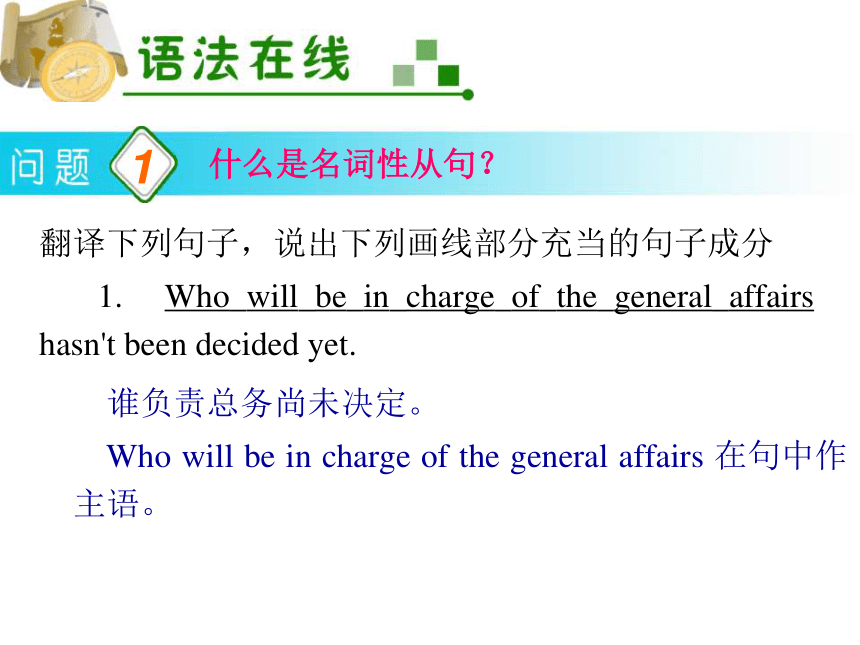 | |
| 格式 | pptx | ||
| 文件大小 | 388.7KB | ||
| 资源类型 | 教案 | ||
| 版本资源 | 外研版 | ||
| 科目 | 英语 | ||
| 更新时间 | 2024-07-20 11:35:08 | ||
图片预览

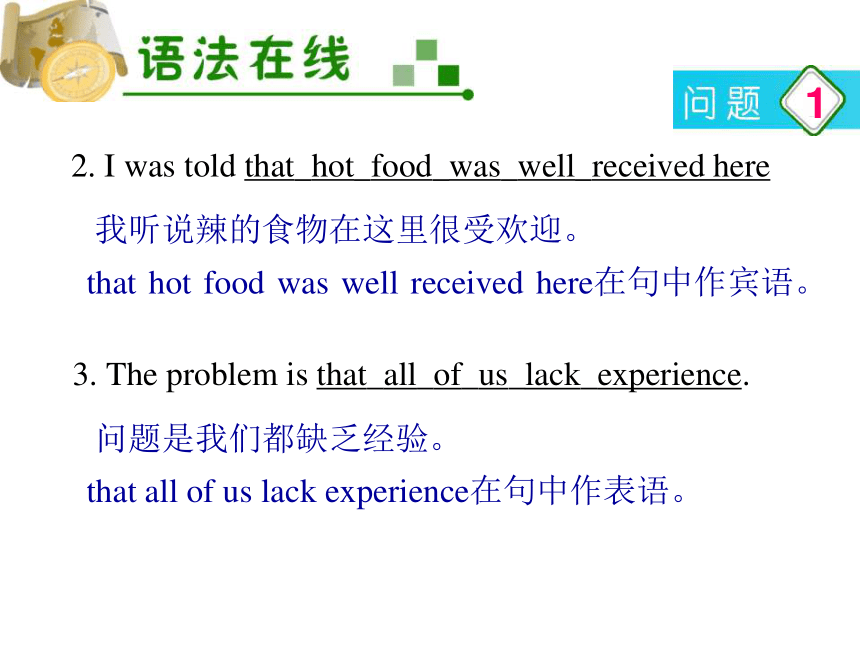
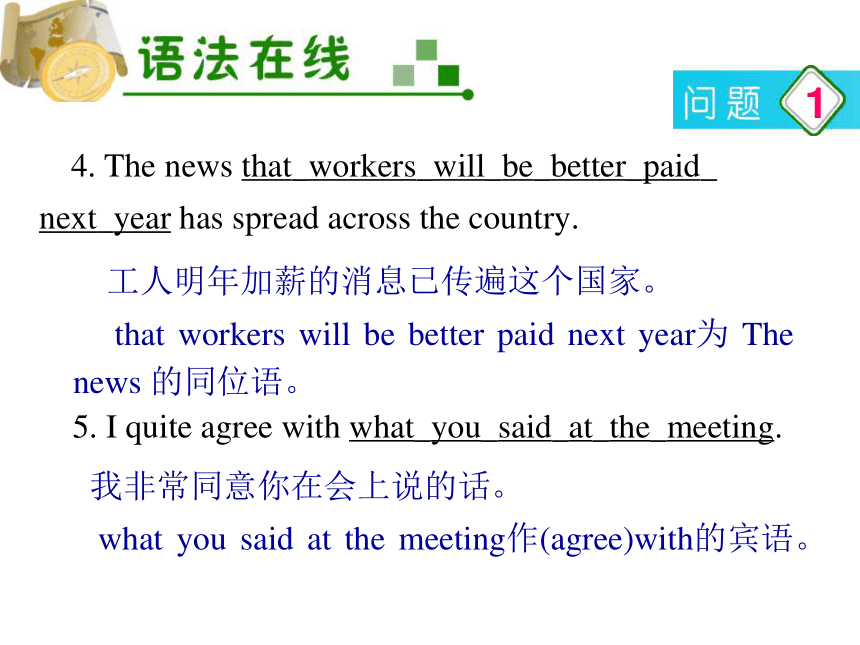
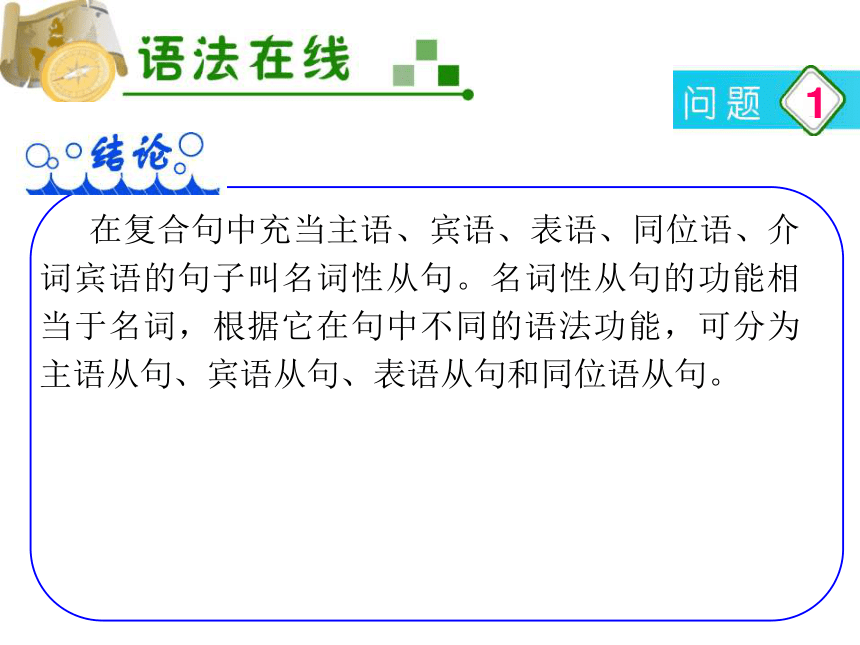
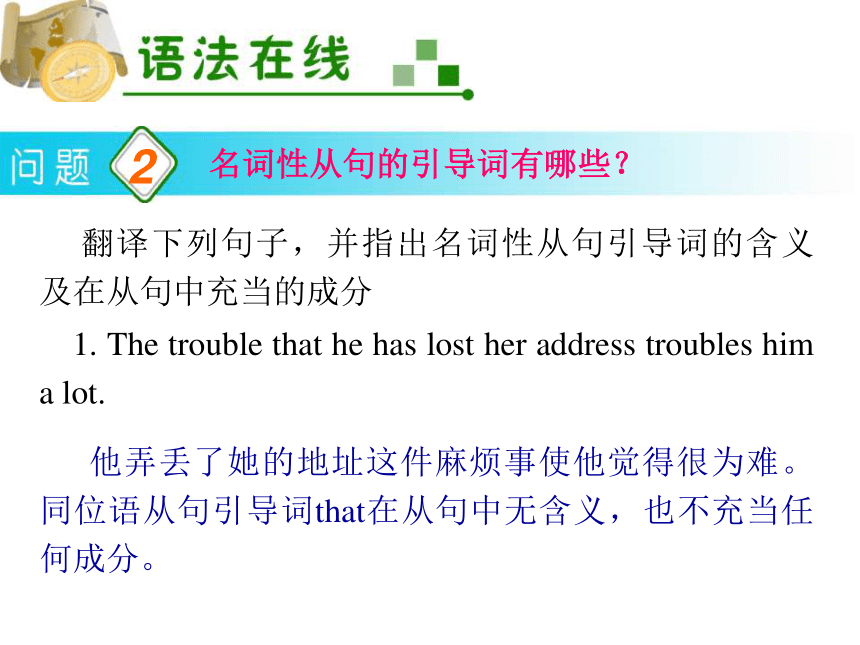
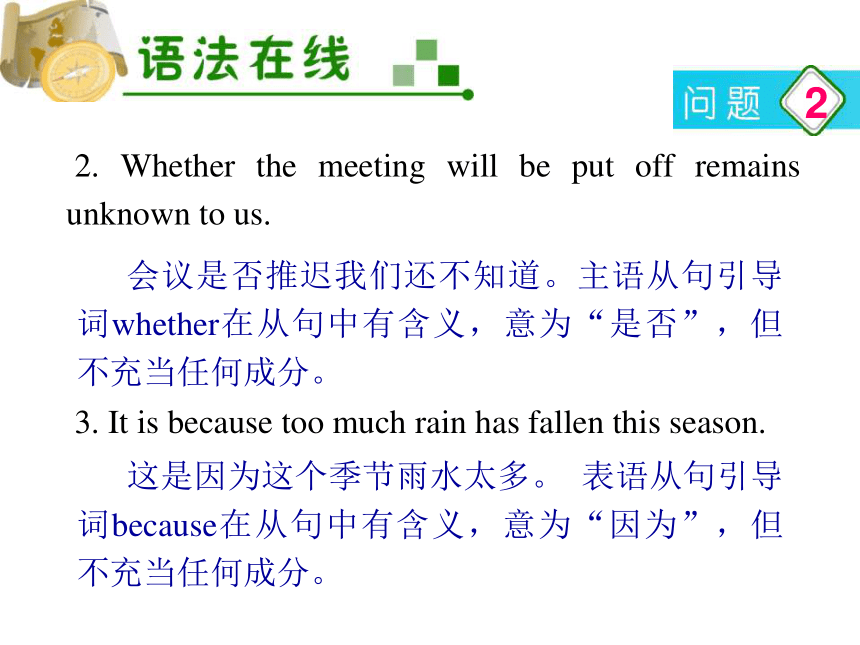
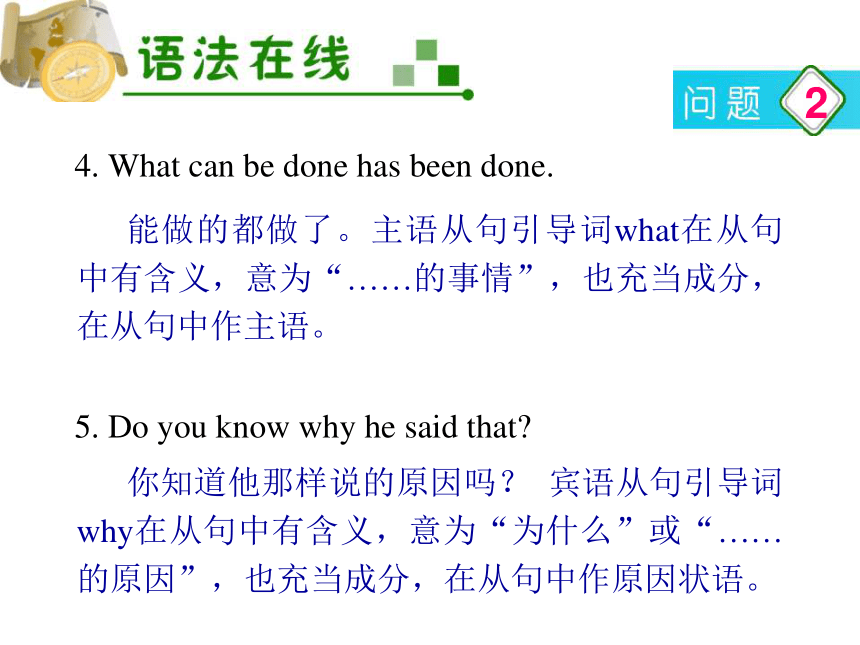
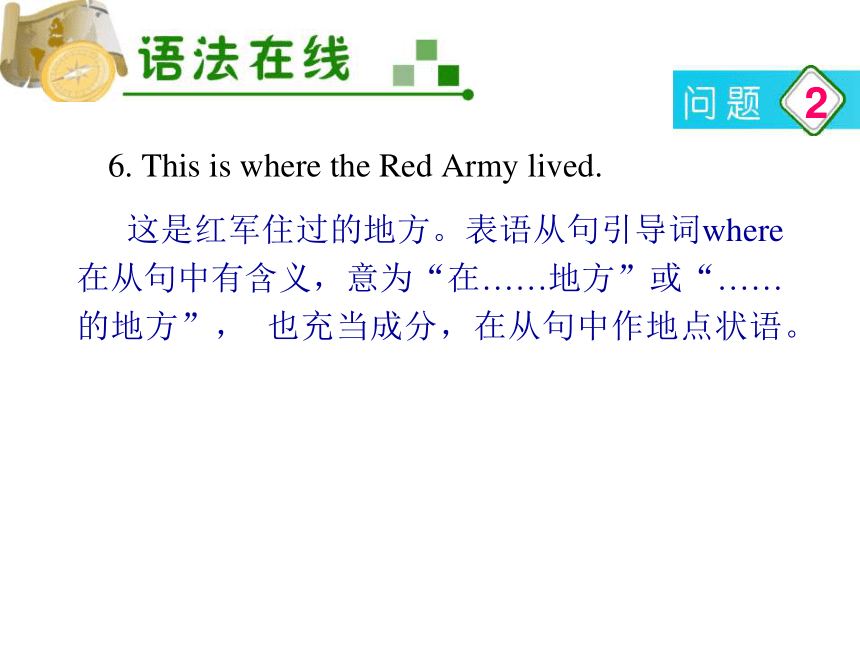
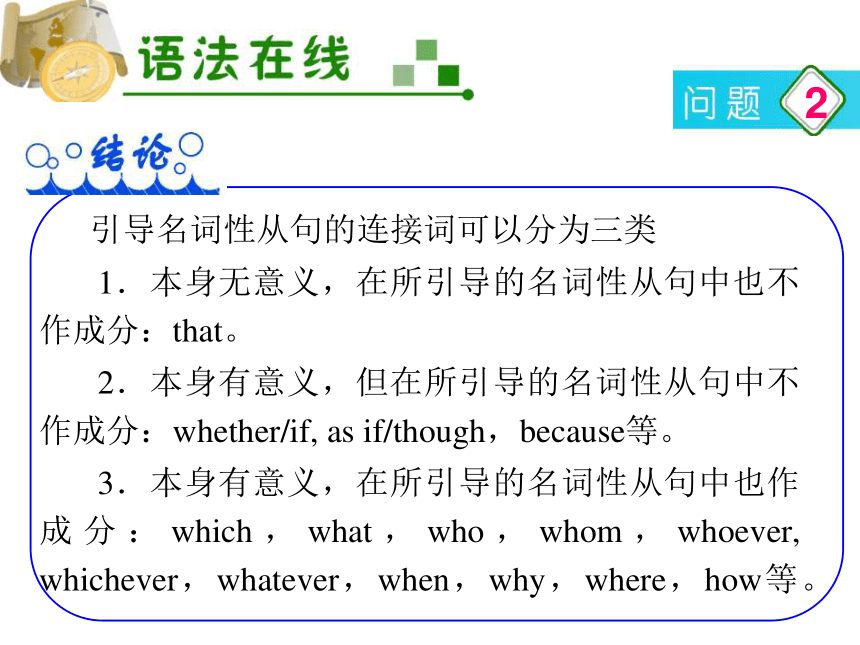
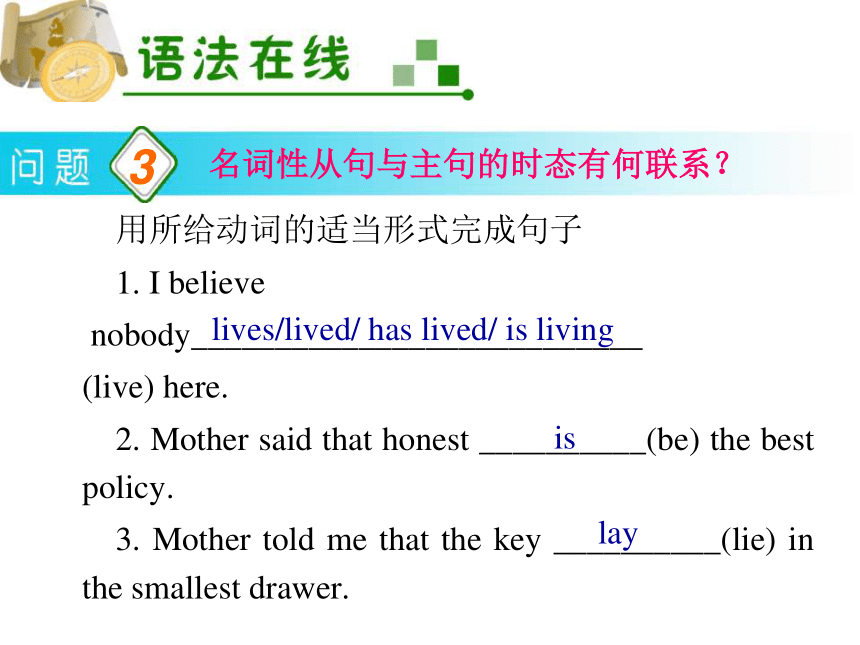
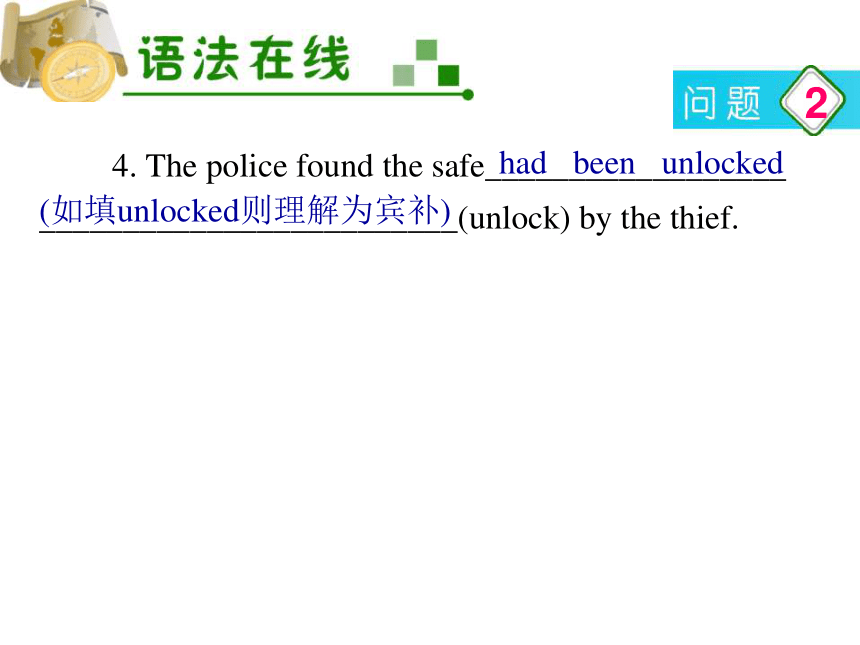
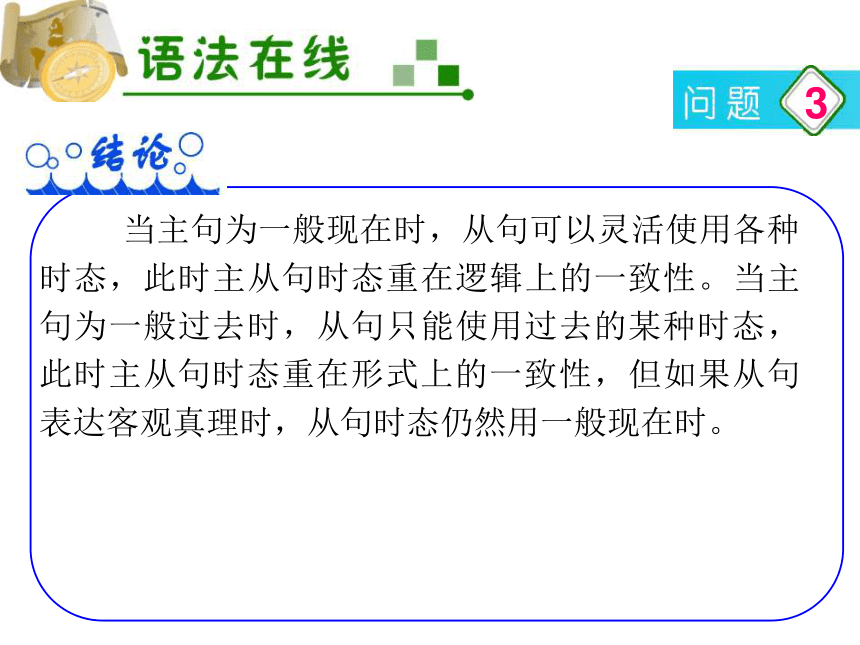
文档简介
(共53张PPT)
翻译下列句子,说出下列画线部分充当的句子成分
1. Who_will_be_in_charge_of_the_general_affairs hasn't been decided yet.
1
什么是名词性从句?
谁负责总务尚未决定。
Who will be in charge of the general affairs 在句中作主语。
2. I was told that_hot_food_was_well_received here
3. The problem is that_all_of_us_lack_experience.
1
我听说辣的食物在这里很受欢迎。
that hot food was well received here在句中作宾语。
问题是我们都缺乏经验。
that all of us lack experience在句中作表语。
4. The news that_workers_will_be_better_paid_
next_year has spread across the country.
5. I quite agree with what_you_said_at_the_meeting.
1
工人明年加薪的消息已传遍这个国家。
that workers will be better paid next year为 The news 的同位语。
我非常同意你在会上说的话。
what you said at the meeting作(agree)with的宾语。
1
在复合句中充当主语、宾语、表语、同位语、介词宾语的句子叫名词性从句。名词性从句的功能相当于名词,根据它在句中不同的语法功能,可分为主语从句、宾语从句、表语从句和同位语从句。
翻译下列句子,并指出名词性从句引导词的含义及在从句中充当的成分
1. The trouble that he has lost her address troubles him a lot.
2
名词性从句的引导词有哪些?
他弄丢了她的地址这件麻烦事使他觉得很为难。同位语从句引导词that在从句中无含义,也不充当任何成分。
2. Whether the meeting will be put off remains unknown to us.
3. It is because too much rain has fallen this season.
2
会议是否推迟我们还不知道。主语从句引导词whether在从句中有含义,意为“是否”,但不充当任何成分。
这是因为这个季节雨水太多。 表语从句引导词because在从句中有含义,意为“因为”,但不充当任何成分。
4. What can be done has been done.
5. Do you know why he said that
2
能做的都做了。主语从句引导词what在从句中有含义,意为“……的事情”,也充当成分,在从句中作主语。
你知道他那样说的原因吗? 宾语从句引导词why在从句中有含义,意为“为什么”或“……的原因”,也充当成分,在从句中作原因状语。
6. This is where the Red Army lived.
2
这是红军住过的地方。表语从句引导词where在从句中有含义,意为“在……地方”或“……的地方”, 也充当成分,在从句中作地点状语。
2
引导名词性从句的连接词可以分为三类
1.本身无意义,在所引导的名词性从句中也不作成分:that。
2.本身有意义,但在所引导的名词性从句中不作成分:whether/if, as if/though,because等。
3.本身有意义,在所引导的名词性从句中也作成分:which,what,who,whom,whoever, whichever,whatever,when,why,where,how等。
用所给动词的适当形式完成句子
1. I believe
nobody___________________________
(live) here.
2. Mother said that honest __________(be) the best policy.
3. Mother told me that the key __________(lie) in the smallest drawer.
3
名词性从句与主句的时态有何联系?
lives/lived/ has lived/ is living
lay
is
4. The police found the safe__________________
_________________________(unlock) by the thief.
had been unlocked (如填unlocked则理解为宾补)
2
3
当主句为一般现在时,从句可以灵活使用各种时态,此时主从句时态重在逻辑上的一致性。当主句为一般过去时,从句只能使用过去的某种时态,此时主从句时态重在形式上的一致性,但如果从句表达客观真理时,从句时态仍然用一般现在时。
翻译下列句子,注意每组句子的语序特点
1. (1)体检前我们可以喝水吗?
(2)我不知道体检前我们是否可以喝水。
4
名词性从句的语序有何特点?
Can we drink water before the medical examination 一般疑问句语序。
I don't know if /whether we can drink water before the medical examination. 引导词后为陈述语序。
2. (1)这个民族喜欢游泳还是射箭?
(2)考官的问题是这个民族喜欢游泳还是射箭。
4
Does this nation like swimming or horse riding?选择疑问句语序。
The question of the interviewer is whether this nation likes swimming or horse riding. 引导词后为陈述语序。
3. (1)我们为什么应该学好英语?
(2)我们为什么应该学好英语不需要进一步解释。
4
Why should we learn English well 特殊疑问句语序。
Why we should learn English well doesn't need any further explanation.引导词后为陈述语序。
4. (1)访问团什么时候出发?
(2)访问团什么时候出发还没决定。
4
When will the visiting group set out?特殊疑问句语序。
When the visiting group will set out hasn't been decided yet.引导词后为陈述语序。
5. (1)你怎么啦?
(2)告诉我你怎么啦。
4
What's the matter with you?疑问词作主语的特殊疑问句语序,此时与陈述语序相同。
Tell me what is the matter with you.(疑问词作主语)陈述语序。
4
名词性从句使用陈述语序。
5
同位语从句与定语从句有何区别?
翻译下列句子,判断画线部分从句类型,并简述理由
1. The news that_our_team_has_won_the_game is true.
我们队赢了那场比赛的消息是真的。句中从句为同位语从句,从句是说明news到底是一个什么消息,即表达其具体内容。
2. The news that_he_told_me_yesterday is true.
5
昨天他告诉我的那个消息是真的。句中从句为定语从句,从句只对news进行限制,起修饰作用。
5
同位语从句和定语从句的区别主要有三方面:
1. 从词类上区别
同位语从句前面的名词主要是idea,fact,news,hope,belief,suggestion,proposal,word,thought,doubt,truth,possibility,promise,order等名词。而定语从句的先行词可以是任何名词,甚至部分代词,主句的一部分或是整个主句,定语从句的先行词逻辑关系上在从句中充当一定成分,同位
5
语从句的名词在从句中不充当任何成分。
2. 从性质上区别
定语从句是从句对其先行词的修饰或限制,属于形容词性从句的范畴;而同位语从句表达前面抽象名词的具体内容,属于名词性从句的范畴,从句与前面的名词是对等关系,可以在彼此间加上连系动词be(是)。
3. 从引导词及其在句子中的成分上区别
5
(1)有些引导词如how, whether, what可以引导同位语从句,但不能引导定语从句。
(2)引导词that引导定语从句时,在从句中一般作主语,表语或宾语[指物时还可以用which代替;指人时还可以用who(m)代替],并且作宾语时常常省略。that在同位语从句中仅起连接作用,不充当任何成分,并且不能省略,也不能用其他词语代替。
翻译下列句子,判断画线部分从句中哪些是主语从句,并简述理由
1. It is a pity that_you_didn't_go_to_see_the_film.
2. It happened hat_nobody_was_on_wattch_when_
the_electricity_was_cut_off.
6
主语从句与强调句型有何区别?
你没去看这场电影太遗憾了。
停电时刚好没人值班。
3. It is at dawn that_the_murder_took_place.
4. It is importantthat_we_should_arouse_the _
awareness_of_self protection.
6
凶案是在拂晓时发生的。
我们唤醒自我保护意识是很重要的。
5. It occurred to me that_he_had_informed_me_of_
the_dos_and_don'ts_in_the_examination.
6
我突然想起他已经告诉过我考试的注意事项。
6
画线部分为主语从句的句子为:1,2,4,5。
共同特点是,从逻辑角度,句中it均可用that从句代替。改写后的句子结构完整,句子意思通顺。含有it作形式主语,而that从句作真正主语的句子中,使用it主要为平衡句子结构,避免头重脚轻,而在强调句型用法中,it无实际含义,纯为固定结构用词。
6
主语从句与强调句型的区别
1.主语从句中的it可以用that从句代替,强调句型不可以。如:It is necessary that we should attend the meeting on time.=That we should attend the meeting is necessary.
2.强调句型中It is/was和that之间的部分叫被强调部分,当把It is/was和that三个单词去掉时,被强调部分可以还原到句子适当位置,而在含有主语从
6
句的句子中It is/was和that之间的部分叫表语,不可 置于其他位置。
用whether 或if填空
1. __________ the meeting will be held in the meeting room or in the open is not known to us.
2. The problem is __________the students can understand the teacher speaking English all through the class.
7
怎么区别名词性从句中的whether 和if
whether
whether
3. Their doubt __________China's economy will keep advancing at high speed is worth considering.
4. __________ my lecture will be well received, I don't know.
5. The decision depends on __________ we can collect enough money.
7
whether
Whether
whether
6. I do care __________ or not the assessment is objective.
7. If you don't know__________ your colleague is reliable or not, try to believe in him or her first.
8. Tell me __________ this is the shortest way to the hotel
7
whether
whether / if
whether / if
7
在名词性从句中whether 和if 含义均为“是否”,但用法有区别,主要区别如下:
1.主语从句只能用whether引导;
2.表语从句只能用whether引导;
3.同位语从句只能用whether引导;
4.位于句首引导主语从句只能用whether;
5.作介词的宾语只能用whether引导;
6.和or not连在一起时只能用whether引导;
7
7.和or not隔开使用时既可用whether也可用if引导。
8. 一般情况下,宾语从句既可用whether也可用if引导;
名词性从句中引导词that省略的情况有哪些?
翻译下列句子,指出句中that是否可以省略
1. That money has no smell is accepted by average people.
8
一般的人都认为钱没有好坏之分。that不可以省略。
2. The possibility is that one out of ten can be admitted into key universities.
3. The vast majority of students hold the view that parents should have faith in their children.
8
可能性是十分之一的人可以上重点大学。 that不可以省略。
大多数学生认为父母应该信任孩子。 that不可以省略。
4. It is amazing that the 160 cm tall basketball player should play in NBA.
5. I sincerely hope that you'll make greater progress in your driving.
8
那个1米60高的篮球运动员竟然打进NBA真不可思议。that不可以省略。
我衷心希望你在驾驶方面进步更大。that可以省略。
6. I promise that I will keep my promise and that if I break my promise, I'd be ready to accept any form of punishment.
7. She may tell you, for example, that she is interested in Chinese.
8
我承诺我会遵守承诺我也承诺假如我违背诺言,我愿接受任何处罚。第一个that可以省略,第二个that不可以省略。
例如,她可能会告诉你,她对汉语感兴趣。that不可以省略。
8
名词性从句中引导词that是否省略的情况如下:
1.that引导主语从句,表语从句,同位语从句时,不可以省略;
2. that引导单个宾语从句时,可以省略;
3. that引导两个或两个以上宾语从句时,第一个that可以省略,但后面的宾语从句引导词that不可省略;
8
4. that虽然引导单个宾语从句,但从句前面有插入语时,引导词that不能省略。
他们已经尽力帮助了她。
what表示“……的事情”= (all) the things that。
翻译下列句子,指出what 从句具体指代的内容
1. They've done what_they_can to help her.
9
名词性从句中连接词what用法有哪些?
2. He is no longer what_he_was.
3. Our income is now double what_it_was ten years ago.
他已经不是以前的那个样子了。
what表示“……的人或……的样子”= the man that。
我们现在的收入是10年前的两倍。
what表示“……的数量或数目”=the amount that。
9
似乎过了几个小时他才苦笑着出来。
what表示“……的时间”=the time that。
1492年哥伦布到达了现在称作美洲大陆的地方。
what表示“……的地方”= the place that。
4. After what_seemed_like_hours he came out with a bitter smile.
5. In 1492, Columbus reached what_is_now_called America.
9
9
what含义上相当于汉语的“所”字结构或“的”字结构,表达人或物(含时间,地点,数目等),相当于定语从句中“先行词+关系代词”,所以其前不能有先行词。
10
名词性从句中连接词疑问词( ever)用法有哪些?
翻译下列句子,比较what,whatever,whichever,whoever, whomever引导的从句的类别
1. These wild flowers are so special that I would do whatever I can to save them.
这些野花如此不同寻常我要竭尽全力(做任何我能做的)来拯救它们。宾语从句。
这些野花如此不同寻常我要做力所能及的事(做我能做的)来拯救它们。宾语从句。
喜欢读什么书就读什么书。宾语从句。
2. These wild flowers are so special that I would do what I can to save them.
3. Read what book you like.
10
无论他说什么,都别信。状语从句。
我可以做我能找到的任何工作。 宾语从句。
4. Don't trust him, whatever he says.
5. I can do whatever work I can find.
10
6. Whatever difficulties we meet, we can work them out.
7. You should wear whichever dress suits you best.
10
无论遇到什么困难,我们都能解决它们。 状语从句。
什么衣服最适合你穿,你就应该穿什么。 宾语从句。
8. There are so many jackets here.Choose whichever you like.
9. Whoever does it, it should be well done.
10
这儿有如此多的夹克衫,喜欢哪件就选哪件吧。宾语从句。
无论谁做这件事,都要做好它。状语从句。
10. Give the book to whoever needs it.
11. Whomever you like, do make sure he is honest.
把这本书给任何一个需要它的人。宾语从句。
无论你喜欢谁,要保证他是诚实的。状语从句。
10
我总是非常热情地欢迎我所邀请的任何人。宾语从句。
12. I always give whomever I invite a warm welcome.
10
1. whatever 可以单独作引导词,引导名词性从句或状语从句,也可与名词一起引导名词性从句或状语从句;
2. what 可以单独作引导词,也可接名词一起引导名词性从句;
3. whichever可以单独作引导词,也可接名词一起引导名词性从句或状语从句;
4. whoever 引导名词性从句或状语从句;
10
5. whomever引导名词性从句或状语从句,此时它在从句中作宾语,可以用whoever代替;
由此可见,what只能引导名词性从句,而whatever,whichever,whoever, whomever 既可以引导名词性从句又可以引导状语从句;whoever, whomever是纯粹引导词,直接引导从句,而what,whatever,whichever 可充当形容词后接名词,此时与后面的名词连用一起引导从句。
10
翻译下列句子,说出下列画线部分充当的句子成分
1. Who_will_be_in_charge_of_the_general_affairs hasn't been decided yet.
1
什么是名词性从句?
谁负责总务尚未决定。
Who will be in charge of the general affairs 在句中作主语。
2. I was told that_hot_food_was_well_received here
3. The problem is that_all_of_us_lack_experience.
1
我听说辣的食物在这里很受欢迎。
that hot food was well received here在句中作宾语。
问题是我们都缺乏经验。
that all of us lack experience在句中作表语。
4. The news that_workers_will_be_better_paid_
next_year has spread across the country.
5. I quite agree with what_you_said_at_the_meeting.
1
工人明年加薪的消息已传遍这个国家。
that workers will be better paid next year为 The news 的同位语。
我非常同意你在会上说的话。
what you said at the meeting作(agree)with的宾语。
1
在复合句中充当主语、宾语、表语、同位语、介词宾语的句子叫名词性从句。名词性从句的功能相当于名词,根据它在句中不同的语法功能,可分为主语从句、宾语从句、表语从句和同位语从句。
翻译下列句子,并指出名词性从句引导词的含义及在从句中充当的成分
1. The trouble that he has lost her address troubles him a lot.
2
名词性从句的引导词有哪些?
他弄丢了她的地址这件麻烦事使他觉得很为难。同位语从句引导词that在从句中无含义,也不充当任何成分。
2. Whether the meeting will be put off remains unknown to us.
3. It is because too much rain has fallen this season.
2
会议是否推迟我们还不知道。主语从句引导词whether在从句中有含义,意为“是否”,但不充当任何成分。
这是因为这个季节雨水太多。 表语从句引导词because在从句中有含义,意为“因为”,但不充当任何成分。
4. What can be done has been done.
5. Do you know why he said that
2
能做的都做了。主语从句引导词what在从句中有含义,意为“……的事情”,也充当成分,在从句中作主语。
你知道他那样说的原因吗? 宾语从句引导词why在从句中有含义,意为“为什么”或“……的原因”,也充当成分,在从句中作原因状语。
6. This is where the Red Army lived.
2
这是红军住过的地方。表语从句引导词where在从句中有含义,意为“在……地方”或“……的地方”, 也充当成分,在从句中作地点状语。
2
引导名词性从句的连接词可以分为三类
1.本身无意义,在所引导的名词性从句中也不作成分:that。
2.本身有意义,但在所引导的名词性从句中不作成分:whether/if, as if/though,because等。
3.本身有意义,在所引导的名词性从句中也作成分:which,what,who,whom,whoever, whichever,whatever,when,why,where,how等。
用所给动词的适当形式完成句子
1. I believe
nobody___________________________
(live) here.
2. Mother said that honest __________(be) the best policy.
3. Mother told me that the key __________(lie) in the smallest drawer.
3
名词性从句与主句的时态有何联系?
lives/lived/ has lived/ is living
lay
is
4. The police found the safe__________________
_________________________(unlock) by the thief.
had been unlocked (如填unlocked则理解为宾补)
2
3
当主句为一般现在时,从句可以灵活使用各种时态,此时主从句时态重在逻辑上的一致性。当主句为一般过去时,从句只能使用过去的某种时态,此时主从句时态重在形式上的一致性,但如果从句表达客观真理时,从句时态仍然用一般现在时。
翻译下列句子,注意每组句子的语序特点
1. (1)体检前我们可以喝水吗?
(2)我不知道体检前我们是否可以喝水。
4
名词性从句的语序有何特点?
Can we drink water before the medical examination 一般疑问句语序。
I don't know if /whether we can drink water before the medical examination. 引导词后为陈述语序。
2. (1)这个民族喜欢游泳还是射箭?
(2)考官的问题是这个民族喜欢游泳还是射箭。
4
Does this nation like swimming or horse riding?选择疑问句语序。
The question of the interviewer is whether this nation likes swimming or horse riding. 引导词后为陈述语序。
3. (1)我们为什么应该学好英语?
(2)我们为什么应该学好英语不需要进一步解释。
4
Why should we learn English well 特殊疑问句语序。
Why we should learn English well doesn't need any further explanation.引导词后为陈述语序。
4. (1)访问团什么时候出发?
(2)访问团什么时候出发还没决定。
4
When will the visiting group set out?特殊疑问句语序。
When the visiting group will set out hasn't been decided yet.引导词后为陈述语序。
5. (1)你怎么啦?
(2)告诉我你怎么啦。
4
What's the matter with you?疑问词作主语的特殊疑问句语序,此时与陈述语序相同。
Tell me what is the matter with you.(疑问词作主语)陈述语序。
4
名词性从句使用陈述语序。
5
同位语从句与定语从句有何区别?
翻译下列句子,判断画线部分从句类型,并简述理由
1. The news that_our_team_has_won_the_game is true.
我们队赢了那场比赛的消息是真的。句中从句为同位语从句,从句是说明news到底是一个什么消息,即表达其具体内容。
2. The news that_he_told_me_yesterday is true.
5
昨天他告诉我的那个消息是真的。句中从句为定语从句,从句只对news进行限制,起修饰作用。
5
同位语从句和定语从句的区别主要有三方面:
1. 从词类上区别
同位语从句前面的名词主要是idea,fact,news,hope,belief,suggestion,proposal,word,thought,doubt,truth,possibility,promise,order等名词。而定语从句的先行词可以是任何名词,甚至部分代词,主句的一部分或是整个主句,定语从句的先行词逻辑关系上在从句中充当一定成分,同位
5
语从句的名词在从句中不充当任何成分。
2. 从性质上区别
定语从句是从句对其先行词的修饰或限制,属于形容词性从句的范畴;而同位语从句表达前面抽象名词的具体内容,属于名词性从句的范畴,从句与前面的名词是对等关系,可以在彼此间加上连系动词be(是)。
3. 从引导词及其在句子中的成分上区别
5
(1)有些引导词如how, whether, what可以引导同位语从句,但不能引导定语从句。
(2)引导词that引导定语从句时,在从句中一般作主语,表语或宾语[指物时还可以用which代替;指人时还可以用who(m)代替],并且作宾语时常常省略。that在同位语从句中仅起连接作用,不充当任何成分,并且不能省略,也不能用其他词语代替。
翻译下列句子,判断画线部分从句中哪些是主语从句,并简述理由
1. It is a pity that_you_didn't_go_to_see_the_film.
2. It happened hat_nobody_was_on_wattch_when_
the_electricity_was_cut_off.
6
主语从句与强调句型有何区别?
你没去看这场电影太遗憾了。
停电时刚好没人值班。
3. It is at dawn that_the_murder_took_place.
4. It is importantthat_we_should_arouse_the _
awareness_of_self protection.
6
凶案是在拂晓时发生的。
我们唤醒自我保护意识是很重要的。
5. It occurred to me that_he_had_informed_me_of_
the_dos_and_don'ts_in_the_examination.
6
我突然想起他已经告诉过我考试的注意事项。
6
画线部分为主语从句的句子为:1,2,4,5。
共同特点是,从逻辑角度,句中it均可用that从句代替。改写后的句子结构完整,句子意思通顺。含有it作形式主语,而that从句作真正主语的句子中,使用it主要为平衡句子结构,避免头重脚轻,而在强调句型用法中,it无实际含义,纯为固定结构用词。
6
主语从句与强调句型的区别
1.主语从句中的it可以用that从句代替,强调句型不可以。如:It is necessary that we should attend the meeting on time.=That we should attend the meeting is necessary.
2.强调句型中It is/was和that之间的部分叫被强调部分,当把It is/was和that三个单词去掉时,被强调部分可以还原到句子适当位置,而在含有主语从
6
句的句子中It is/was和that之间的部分叫表语,不可 置于其他位置。
用whether 或if填空
1. __________ the meeting will be held in the meeting room or in the open is not known to us.
2. The problem is __________the students can understand the teacher speaking English all through the class.
7
怎么区别名词性从句中的whether 和if
whether
whether
3. Their doubt __________China's economy will keep advancing at high speed is worth considering.
4. __________ my lecture will be well received, I don't know.
5. The decision depends on __________ we can collect enough money.
7
whether
Whether
whether
6. I do care __________ or not the assessment is objective.
7. If you don't know__________ your colleague is reliable or not, try to believe in him or her first.
8. Tell me __________ this is the shortest way to the hotel
7
whether
whether / if
whether / if
7
在名词性从句中whether 和if 含义均为“是否”,但用法有区别,主要区别如下:
1.主语从句只能用whether引导;
2.表语从句只能用whether引导;
3.同位语从句只能用whether引导;
4.位于句首引导主语从句只能用whether;
5.作介词的宾语只能用whether引导;
6.和or not连在一起时只能用whether引导;
7
7.和or not隔开使用时既可用whether也可用if引导。
8. 一般情况下,宾语从句既可用whether也可用if引导;
名词性从句中引导词that省略的情况有哪些?
翻译下列句子,指出句中that是否可以省略
1. That money has no smell is accepted by average people.
8
一般的人都认为钱没有好坏之分。that不可以省略。
2. The possibility is that one out of ten can be admitted into key universities.
3. The vast majority of students hold the view that parents should have faith in their children.
8
可能性是十分之一的人可以上重点大学。 that不可以省略。
大多数学生认为父母应该信任孩子。 that不可以省略。
4. It is amazing that the 160 cm tall basketball player should play in NBA.
5. I sincerely hope that you'll make greater progress in your driving.
8
那个1米60高的篮球运动员竟然打进NBA真不可思议。that不可以省略。
我衷心希望你在驾驶方面进步更大。that可以省略。
6. I promise that I will keep my promise and that if I break my promise, I'd be ready to accept any form of punishment.
7. She may tell you, for example, that she is interested in Chinese.
8
我承诺我会遵守承诺我也承诺假如我违背诺言,我愿接受任何处罚。第一个that可以省略,第二个that不可以省略。
例如,她可能会告诉你,她对汉语感兴趣。that不可以省略。
8
名词性从句中引导词that是否省略的情况如下:
1.that引导主语从句,表语从句,同位语从句时,不可以省略;
2. that引导单个宾语从句时,可以省略;
3. that引导两个或两个以上宾语从句时,第一个that可以省略,但后面的宾语从句引导词that不可省略;
8
4. that虽然引导单个宾语从句,但从句前面有插入语时,引导词that不能省略。
他们已经尽力帮助了她。
what表示“……的事情”= (all) the things that。
翻译下列句子,指出what 从句具体指代的内容
1. They've done what_they_can to help her.
9
名词性从句中连接词what用法有哪些?
2. He is no longer what_he_was.
3. Our income is now double what_it_was ten years ago.
他已经不是以前的那个样子了。
what表示“……的人或……的样子”= the man that。
我们现在的收入是10年前的两倍。
what表示“……的数量或数目”=the amount that。
9
似乎过了几个小时他才苦笑着出来。
what表示“……的时间”=the time that。
1492年哥伦布到达了现在称作美洲大陆的地方。
what表示“……的地方”= the place that。
4. After what_seemed_like_hours he came out with a bitter smile.
5. In 1492, Columbus reached what_is_now_called America.
9
9
what含义上相当于汉语的“所”字结构或“的”字结构,表达人或物(含时间,地点,数目等),相当于定语从句中“先行词+关系代词”,所以其前不能有先行词。
10
名词性从句中连接词疑问词( ever)用法有哪些?
翻译下列句子,比较what,whatever,whichever,whoever, whomever引导的从句的类别
1. These wild flowers are so special that I would do whatever I can to save them.
这些野花如此不同寻常我要竭尽全力(做任何我能做的)来拯救它们。宾语从句。
这些野花如此不同寻常我要做力所能及的事(做我能做的)来拯救它们。宾语从句。
喜欢读什么书就读什么书。宾语从句。
2. These wild flowers are so special that I would do what I can to save them.
3. Read what book you like.
10
无论他说什么,都别信。状语从句。
我可以做我能找到的任何工作。 宾语从句。
4. Don't trust him, whatever he says.
5. I can do whatever work I can find.
10
6. Whatever difficulties we meet, we can work them out.
7. You should wear whichever dress suits you best.
10
无论遇到什么困难,我们都能解决它们。 状语从句。
什么衣服最适合你穿,你就应该穿什么。 宾语从句。
8. There are so many jackets here.Choose whichever you like.
9. Whoever does it, it should be well done.
10
这儿有如此多的夹克衫,喜欢哪件就选哪件吧。宾语从句。
无论谁做这件事,都要做好它。状语从句。
10. Give the book to whoever needs it.
11. Whomever you like, do make sure he is honest.
把这本书给任何一个需要它的人。宾语从句。
无论你喜欢谁,要保证他是诚实的。状语从句。
10
我总是非常热情地欢迎我所邀请的任何人。宾语从句。
12. I always give whomever I invite a warm welcome.
10
1. whatever 可以单独作引导词,引导名词性从句或状语从句,也可与名词一起引导名词性从句或状语从句;
2. what 可以单独作引导词,也可接名词一起引导名词性从句;
3. whichever可以单独作引导词,也可接名词一起引导名词性从句或状语从句;
4. whoever 引导名词性从句或状语从句;
10
5. whomever引导名词性从句或状语从句,此时它在从句中作宾语,可以用whoever代替;
由此可见,what只能引导名词性从句,而whatever,whichever,whoever, whomever 既可以引导名词性从句又可以引导状语从句;whoever, whomever是纯粹引导词,直接引导从句,而what,whatever,whichever 可充当形容词后接名词,此时与后面的名词连用一起引导从句。
10
同课章节目录
- 词法
- 名词
- 动词和动词短语
- 动词语态
- 动词时态
- 助动词和情态动词
- 非谓语动词
- 冠词
- 代词
- 数词和量词
- 形容词副词及其比较等级
- 介词和介词短语
- 连词和感叹词
- 构词法
- 相似、相近词比较
- 句法
- 陈述句
- 一般疑问句和否定疑问句
- 特殊疑问句及选择疑问句
- 反意疑问句
- 存在句(There be句型)
- 宾语从句
- 定语从句
- 状语从句
- 主谓一致问题
- 简单句
- 并列句
- 复合句
- 主谓一致
- 主、表语从句
- 名词性从句
- 直接引语和间接引语
- 虚拟语气
- 感叹句
- 强调句
- 倒装句
- 祈使句
- 句子的成分
- 句子的分类
- 题型专区
- 单项选择部分
- 易错题
- 完形填空
- 阅读理解
- 词汇练习
- 听说训练
- 句型转换
- 补全对话
- 短文改错
- 翻译
- 书面表达
- 任务型阅读
- 语法填空
- 其他资料
